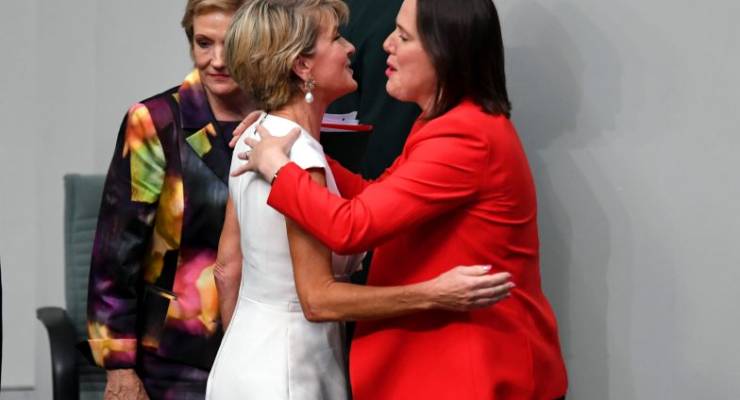
Julie Bishop has decided to pull the pin, and the Liberal Party has slid into yet another “woman crisis”. The party’s two most senior women have resigned, another has jumped ship to become an independent and even more have failed in tough preselections. Yet the party still has no clear strategy for repairing the damage.
Years of reciting the mantra of “merit over quotas” has reduced their female representation to less than half of Labor’s. The Liberal Party may well end up with 15% women in Parliament after the next election.
The point that is mostly missed about the issue of quotas is that even if the Liberals adopted quotas today it would take 20 to 25 years before they reach a 50% position. The percentage of Labor women in Parliament 25 years ago was similar to the Liberal percentage now. People think that quotas are imposed and then women get elected by magic, but they’re really just the first step.
In the ’80s most Labor women were not in favour of quotas. We were pleased that the Labor Party had adopted a “policy” that women should comprise 30% of all public positions. This policy was in place all through the ’80s, but we saw nothing changing. The percentage of women in public positions barely shifted. Does this sound familiar? Hello Liberal Party of today.
So in 1994 at the Labor Party National Conference in Tasmania the women forced through their famous “quota” motion. The media snapped photos of triumphant women dancing on the conference floor amid a flurry of green and purple ribbons. The motion stated that the party had to put forward 30% women candidates in winnable seats, and if this did not happen, then the National Executive had the authority to intervene and replace candidates.
It was this authority to intervene that was the effective sanction. Despite all the controversy attached to the word, “quotas” are really only targets with sanctions attached.
The sanction proved to be a powerful one and it forced the factions to “catch and kill their own”. Suddenly the factions were scrambling around trying to find their “own women” to put in public positions because they knew that if this did not happen the National Executive might put in a woman from another faction, and there is nothing that factional leaderships dislike more than losing control of positions.
Despite the women’s sense of urgency the pace of change was deadly slow. Old blokes failing to see the writing on the wall and kind-hearted women reluctant to look pushy was one problem. The simple maths of three- or four-year preselection cycles was another. It all took time.
The state branches tried different ways to hurry the process along. Branches which did not have rank and file preselections such as Victoria fiddled with their procedures about composition of the central selection panel. NSW, which had rank and file preselections, simply weighted votes for female candidates by 20%. Impressively this rule has rarely been used. Its existence was the boost that was needed for women candidates to flourish. More importantly the new “quota” changed the culture of the party. Women were expected to be put forward as candidates and that is what happened.
The original 30% female quota was eventually changed to “40% women, 40% men and 20% either”. The “20% either” terminology was ridiculed but it looked to protect men from the slavering hoard of women who were considered on the verge of taking over the country.
Now the Labor Party has a 50% rule which will almost certainly be fulfilled at this election, but it is exactly 25 years since the original quota rule was instituted.
If we could change our minds about quotas, then Liberal women should be able to. The present state of their party demands it. There have been lone voices within the party for the last 10 years; former Liberal senator Judith Troeth wrote a watershed article in 2010 broaching the subject. There have been tentative suggestions from Sussan Ley and even Marise Payne that the party should rethink the issue.
Sisters, you must. Even if you start now it’s going to take forever.
Dr Meredith Burgmann is a founder of Emily’s List and has written a book on misogyny. She was elected to parliament before quotas were established. However she would have been perfectly happy to have been called a token woman and a second class legislator as a result of party quotas.







Crikey is committed to hosting lively discussions. Help us keep the conversation useful, interesting and welcoming. We aim to publish comments quickly in the interest of promoting robust conversation, but we’re a small team and we deploy filters to protect against legal risk. Occasionally your comment may be held up while we review, but we’re working as fast as we can to keep the conversation rolling.
The Crikey comment section is members-only content. Please subscribe to leave a comment.
The Crikey comment section is members-only content. Please login to leave a comment.